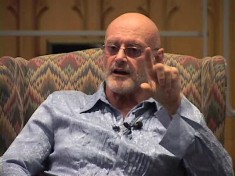| Ken Wilber | |
|---|---|
 |
|
| Psychologist | |
| Born | Jan. 31, 1949 (age 64) Oklahoma City, Oklahoma, United States |
| Nationality | American |
Ken Wilber is a leading-edge thinker, philosopher, and author whose works have been embraced both in New Age circles as well as within the realm of serious academia. Not without his critics, Wilber has nevertheless become a powerful influence on modern thought across a wide array of fields. He has made significant contributions to a branch of psychology called transpersonal psychology and he is a best-selling author as well.
Childhood and College Years
Ken Wilber was born in Oklahoma City in 1949. He was an only child. An intelligent student, his nickname in high school was “The Brain.” In 1967, he was accepted at Duke University in its pre-med program. His interests took a fast turn, however, when he discovered Eastern philosophies and mysticism. This prompted him to transfer his studies to the University of Nebraska where he earned an undergraduate degree in biology and a master’s degree in biochemistry.
Becoming an Author
All the while during his college years, Wilber was working on his first book, which helped launch his career. The book was titled The Spectrum of Consciousness. It was rejected by almost two dozen publishers before Quest Books took a chance on a twenty-something, self-styled, and unknown philosopher. The book was published in 1977.
The Spectrum of Consciousness stunned many in the world of philosophy and literature. It was an extremely comprehensive work which integrated vast areas of knowledge across a variety of fields. It was complex, yet the writing was lucid, engaging, and brilliant. This first book put Wilber “on the map,” so to speak, as a leading thinker of his day.
Other Major Publications
Wilber published his next book in 1982. It was The Holographic Paradigm and Other Paradoxes, which proposed that the human brain, our minds, consciousness and perhaps the entire universe is a holographic in structure and nature. In it, Wilber built upon the ideas of many others, such as physicist David Bohm and cutting-edge brain researcher Carl Pribram.
The next year, Wilber married Terry Killam, but she was diagnosed with an aggressive form of breast cancer within the year. Wilber put his career aside to care for his wife, but she lost an agonizing battle with the disease in 1989. Wilber was devastated. He later published a book entitled Grace and Grit, documenting the experience with his wife. The book came out in 1991.
Wilber’s Expansive Philosophy
 The work of Ken Wilber centers on an attempt to bridge religion and science, and to “explain everything.” Specifically, Wilber believes that ancient systems of thought coming out of Vedic and Buddhist traditions anticipated many of the revelations of modern physics, especially quantum theory. But Wilber also pays great attention to new theories of the brain, the mind, and how human beings have come to achieve self-reflective consciousness.
The work of Ken Wilber centers on an attempt to bridge religion and science, and to “explain everything.” Specifically, Wilber believes that ancient systems of thought coming out of Vedic and Buddhist traditions anticipated many of the revelations of modern physics, especially quantum theory. But Wilber also pays great attention to new theories of the brain, the mind, and how human beings have come to achieve self-reflective consciousness.
Wilber is concerned with the most basic questions of existence: Who are we? What are human beings? Why do we have consciousness? Is our consciousness part of a greater system? How do conceptions of God sway the big picture? What is our meaning or place in the universe?
In his book, A Theory of Everything, Wilber tries to bring many fundamental areas of experience together to show how they all influence each other, and how they actually make up a unified whole. He attempts to show how business, science, spirituality and consciousness all work together to create a dynamic process that is existence itself.
Ideas on Transpersonal Psychology
Although Ken Wilber is a philosopher more so than a psychologist, he is often associated with transpersonal psychology. This is a natural fit for Wilber since transpersonal psychology is concerned with the spiritual and transcendent aspects of the mind and integrating it into the more practical theories of modern psychology.
In his 2007 book, Up From Eden, Wilber makes an attempt to demonstrate that human consciousness has evolved from a lower state to a higher state over hundreds of thousands of years. Furthermore, Wilber says that the journey is not over and that humankind is struggling today to evolve to an even higher state of awareness.
Holons and Quadrants
Two important concepts for Ken Wilber are the “holon” and “quadrants.” A holon is a term of philosophy for something that is at once “whole” yet made up of parts. Wilber seeks to understand holons better by separating, or showing them as four broad categories.
Viewing a holon in terms of quadrants makes it easier for us to visualize and understand complex systems made up of many parts, but which all comprise a seamless whole when taken together.
Wilber’s Continued Influence
At age 64, Ken Wilber remains a significant figure among modern philosophers. Many have criticized Wilber as “just another New Ager,” but he also commands enormous respect among scientists, philosophers, psychologists and the general public — who buy thousands of his books every year.